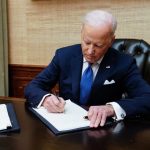Donald Trump has made his stance on a federal abortion ban perfectly clear, and it seems to have come as a surprise to some. During the recent vice presidential debate, Trump took to the social media platform now known as X to announce, in no uncertain terms, that he would veto any federal abortion ban. This proclamation came just as Trump’s running mate, Senator J.D. Vance, was tackling the complex and ever-controversial topic of abortion on the debate stage.
In his social media post, Trump emphasized the importance of states’ rights, claiming it should be up to the individual states to decide on abortion policies, reflecting the will of their voters. This makes sense in a country as diverse as the United States, where opinions on this issue can swing wildly from coast to coast. Voters in California, for instance, often have different views than those in Georgia or Arizona, and Trump is making it known that he respects that distinction.
EVERYONE KNOWS I WOULD NOT SUPPORT A FEDERAL ABORTION BAN, UNDER ANY CIRCUMSTANCES, AND WOULD, IN FACT, VETO IT, BECAUSE IT IS UP TO THE STATES TO DECIDE BASED ON THE WILL OF THEIR VOTERS (THE WILL OF THE PEOPLE!). LIKE RONALD REAGAN BEFORE ME, I FULLY SUPPORT THE THREE…
— Donald J. Trump (@realDonaldTrump) October 2, 2024
Senator Vance, in a display of what might be called strategic oratory, echoed these sentiments during the debate. He reiterated Trump’s position on a national abortion ban, indicating that while a national minimum might be acceptable, he has never supported an outright ban. When Senator Vance previously ran for the Senate, he speculated about a national standard, yet now it seems he may have learned that it’s best not to get ahead of the boss on such a critical issue. This was evident when Vance, reflecting post-debate, admitted the importance of aligning thoughts with Trump before making public comments.
Meanwhile, Trump and Vance’s evolving dialogue serves as a reminder of the complexities that surround the abortion debate within the Republican Party. Trump’s previous remarks about supporting certain exceptions for abortion, such as instances of rape, incest, and threats to the mother’s life, align with a more moderate conservative stance that seeks to satisfy multiple factions within the party. This nuanced approach, akin to the policies of Ronald Reagan, aims to appeal to a broader base without alienating any significant groups.
However, the internal dynamics of Trump’s campaign and Vance’s communications raise eyebrows, emphasizing a classic case of needing to clarify the chain of command when it comes to speaking on policy. As this back-and-forth continues, one thing remains clear: abortion is a contentious topic in American politics that requires not just careful navigation but also a deep understanding of the sentiments of voters nationwide. Not every state feels the same, and for Trump, it’s all about keeping the conversation focused where it belongs: at the state level where local voices matter the most.




